China
Unforgettable China: Unveiling History, Culture & Natural Wonders
Embark on a journey to China, a land where ancient traditions blend harmoniously with modern dynamism, and where a captivating culture awaits to be discovered. Immerse yourself in the timeless teachings of Confucianism, embracing the importance of family bonds and social harmony. Feel the tranquility of Daoism as you wander through serene landscapes, connecting with nature's wisdom. Experience the profound spirituality of Buddhism, fostering compassion and enlightenment. Indulge your taste buds in the tantalizing symphony of Chinese cuisine, savoring the delicate flavors, vibrant colors, and culinary artistry.
Marvel at the intricate brushstrokes of Chinese calligraphy and the masterful craftsmanship of exquisite ceramics. Feel the vibrancy of Chinese festivals, where the streets come alive with dazzling parades, fireworks, and the joyous spirit of celebration. China's rich cultural tapestry beckons, inviting you to explore its timeless heritage, to immerse yourself in its traditions, and to forge unforgettable memories. Let China's enchanting culture inspire your senses and ignite a desire to embark on an unforgettable adventure of discovery.
Beijing - A Historical and Cultural Haven

Photo by Zhang Kaiyv / Pexels | As the capital of China, Beijing is a city steeped in history and brimming with cultural treasures. Retirees will find themselves captivated by the iconic landmarks, such as the majestic Forbidden City, the awe-inspiring Great Wall of China, and the serene Summer Palace, a UNESCO World Heritage Site and one of the most popular tourist destinations in China.
|
These sites offer a glimpse into China's imperial past, and the slower pace of exploration allows retirees to fully absorb their historical significance. Beijing's numerous parks, including the beautiful Temple of Heaven, provide tranquil settings for relaxation and tai chi exercises—a popular activity among retirees seeking to maintain their well-being.
|
Shanghai - A Fusion of Tradition and Modernity

Photo by Manuel Joseph / Pexels | Shanghai, the most populous city in China, is an ideal destination for those seeking a blend of tradition and modernity. The city's historic waterfront area, the Bund, showcases a stunning contrast between colonial-era buildings and the futuristic skyline of Pudong. Take a leisurely walk along the promenade, appreciating the architectural grandeur and enjoy the views of the Huangpu River. Then, as night falls, witness the Bund transform into a spectacular sea of colorful lights.
|
|
Shanghai's vibrant arts and entertainment scene, including classical music concerts and traditional Chinese opera performances, offers retirees a chance to immerse themselves in the city's rich cultural heritage. Additionally, the peaceful Yu Garden provides a serene escape from the bustling city streets, allowing retirees to find solace in its traditional Chinese architecture and tranquil landscapes. |
Xi'an - An Ancient Capital Preserving History
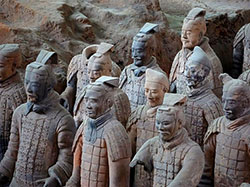
Photo by Tracey Wong / Pixabay | Xi'an, the ancient capital of China, holds significant historical value. The Terracotta Army, an archaeological wonder, showcases thousands of life-sized clay soldiers, chariots, and horses buried with the first emperor of China, Qin Shi Huang, who unified China in 221 BCE and sought to continue his rule even in death. To achieve this, he ordered the construction of an enormous underground mausoleum complex. |
Each terracotta soldier was individually crafted with distinctive features, and the army was arranged in battle formation to defend the emperor's tomb. The creation of this massive funerary complex was a monumental undertaking, reflecting the grandeur and ambition of Qin Shi Huang's reign.
Xi'an's well-preserved City Walls, spanning over 8 miles, offer an opportunity for leisurely strolls or bike rides, providing retirees with panoramic views of the city. The Wild Goose Pagoda, a symbol of Xi'an's rich Buddhist heritage, offers a serene atmosphere for meditation and reflection—a welcome respite for retirees seeking spiritual experiences. |
Chengdu - The Panda Paradise:

Photo by Ramaz Bluashvili / Pexels | Chengdu is an irresistible destination known for its cuddly ambassadors—the giant pandas. The Chengdu Panda Research Base allows visitors to observe these adorable creatures up close, learning about conservation efforts and the pandas' daily lives. Retirees can indulge in the joys of panda-watching and capture memorable photographs. Chengdu's allure extends beyond its beloved pandas, making it an ideal destination for senior tourists seeking a blend of tranquility and cultural immersion.
|
|
The city's ancient tea houses, such as the historic Wuhou Shrine Tea House, provide a serene setting for retirees to partake in traditional tea ceremonies, mingle with locals, and share stories over fragrant brews. Moreover, Chengdu's vibrant street food scene offers a tantalizing array of Sichuan dishes, from mouthwatering hotpot to savory dumplings, allowing senior travelers to embark on a culinary journey that caters to their refined palates. With its captivating blend of nature, culture, and cuisine, Chengdu offers seniors an enriching and unforgettable vacation experience.
|
Guilin - Scenic Beauty and Tranquility

Photo by Mercier Zeng / Pixabay | Guilin's breathtaking natural landscapes and tranquility make it an ideal serene retreat. The Li River cruise is a highlight, offering a chance to meander through the karst mountains, marvel at picturesque scenery, and immerse oneself in the region's ethereal beauty. For the more adventurous, the Longji Rice Terraces present a hiking opportunity amidst terraced fields to witness the harmony between nature and human cultivation.
|
| Guilin's laid-back atmosphere, soothing hot springs, and traditional Chinese painting classes provide retirees with opportunities to unwind, rejuvenate, and indulge in artistic pursuits. |
Dali: Experience Ancient China Amidst Breathtaking Scenery
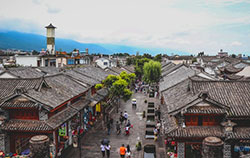
Photo by Ce Amtic / Unsplash | Dali Old Town, is located in the picturesque landscapes of Yunnan Province, China. This well-preserved ancient town offers a delightful retreat for travelers seeking tranquility, history, and cultural immersion. As you wander through its narrow cobblestone streets, you'll be enchanted by traditional Bai architecture, characterized by white-walled houses with upturned eaves and intricately carved details.
|
|
Immerse yourself in the local ambiance as you explore the vibrant markets, sample delicious street food, and discover unique handicrafts crafted by skilled artisans. Beyond the town's boundaries, you'll find the serene Erhai Lake, framed by lush mountains, where you can embark on a leisurely boat ride or simply savor the serenity of the surroundings. With its charming blend of ancient allure and natural beauty, Dali Old Town offers a timeless escape for retirees and travelers seeking a truly memorable Chinese experience. |
Best Time to Visit:
The best time to visit China depends on various factors such as the region you plan to visit and your personal preferences. Generally, the spring (April to May) and autumn (September to October) seasons are considered the best times to visit China. During these seasons, the weather is often mild and comfortable, with pleasant temperatures and less rainfall in many parts of the country. It is an ideal time to explore popular destinations like Beijing, Shanghai, Xi'an, and Guilin.
However, it's important to note that China is a vast country with diverse climates. If you're planning to visit specific regions, such as the northeast or northwest, it's advisable to consider the local weather patterns. For example, summer (June to August) is a popular time to visit areas like Tibet or the northern regions, as they experience milder temperatures.
Additionally, it's important to take into account major holidays and festivals, such as Chinese New Year (usually in January or February) and the National Day Holiday (October 1-7). These periods can be crowded and prices for accommodations and transportation may be higher.
Ultimately, the best time to visit China depends on your preferences for weather, specific regions, and whether you prefer to avoid peak tourist seasons or experience popular festivals.
Travel Planning Tips:
- Visa Requirements: Check the visa requirements for your country of residence and ensure you have the necessary documentation before traveling to China.
- Research and Itinerary Planning: Research the attractions, cities, and regions you want to visit in China. Create an itinerary that allows you to make the most of your time and covers your areas of interest.
- Weather Considerations: Take into account the weather conditions in different parts of China during your travel dates. Pack appropriate clothing and gear to suit the season and climate of your destinations.
- Language: Learn a few basic Mandarin phrases or carry a translation app to help with communication, as English may not be widely spoken, particularly in rural areas.
- Currency: Familiarize yourself with the local currency (Chinese Yuan/RMB) and exchange some currency before arriving in China. ATMs are widely available in major cities, but it's recommended to carry some cash for remote areas.
- Accommodation: Book accommodations in advance, especially during peak travel seasons, to secure your preferred choices. Consider staying in reputable hotels or guesthouses with good reviews.
- Local Customs and Etiquette: Familiarize yourself with Chinese customs and etiquette to show respect to the local culture. For example, it's common to greet with a slight bow or handshake, remove shoes when entering someone's home, and avoid sensitive topics of discussion.
Transportation:
Always prioritize your safety and follow local laws and regulations when using transportation in China. Plan your routes in advance, allow ample time for travel, and consider the specific needs and comfort level of your travel party.
- Domestic Flights: Domestic flights are a popular and efficient mode of transportation for traveling longer distances within China. Book flights in advance to secure better fares and schedules. Stick to reputable airlines with good safety records.
- Trains:China's extensive high-speed rail network is well-developed and offers a comfortable and convenient way to travel between major cities. High-speed trains are known for their efficiency, speed, and safety. Book tickets in advance, especially during peak travel seasons.
- Buses: Buses are a common mode of transportation in China, both within cities and for intercity travel. City buses are generally affordable and well-connected, but be prepared for potential language barriers when communicating with drivers or reading bus schedules. Long-distance buses are available for traveling between cities, but they may not be as comfortable or efficient as trains or flights.
- Metro/Subway: Many cities in China have a modern and extensive metro/subway system, offering a convenient and affordable way to get around within the city. Familiarize yourself with the metro lines and maps, and be mindful of rush hours when trains can be crowded.
- Taxis and Ride-Sharing: Taxis re readily available in most cities, and ride-sharing services like Didi (similar to Uber) are popular and widely used in China. Ensure the taxi is properly licensed and use reputable ride-sharing apps to ensure safety.
- Language Assistance: Have your destination written in Chinese characters (such as your hotel or major attractions) to facilitate communication with drivers or locals who may not speak English. Translation apps or phrasebooks can also be handy for basic communication.
- Public Bicycles: Many cities in China offer public bicycle-sharing programs, allowing you to rent bicycles for short-distance travel within the city. This can be a convenient and eco-friendly option for exploring local areas. Follow traffic rules and be cautious when cycling in busy areas.
- Walking: China's cities often have well-designed pedestrian-friendly areas, and walking can be an enjoyable way to explore attractions and neighborhoods. Use pedestrian crossings and follow traffic signals for safety.
- Language Assistance: Have your destination written in Chinese characters (such as your hotel or major attractions) to facilitate communication with drivers or locals who may not speak English. Translation apps or phrasebooks can also be handy for basic communication.
- Be Mindful of Scams: Exercise caution with unlicensed taxis or private transportation offers from strangers. Stick to official transportation services or reputable ride-sharing apps to avoid scams or overcharging.
- Stay Updated on Travel Advisories: Check for any travel advisories or warnings related to transportation in your specific destination. Monitor local news, follow guidance from your embassy or consulate, and stay informed about any disruptions or safety concerns.
Safety Tips:
- Stay Vigilant: Take precautions against petty theft by keeping an eye on your belongings and avoiding crowded areas. Be cautious of scams, particularly in tourist areas. Be wary of unsolicited help or offers that seem too good to be true.
- Use Reliable Transportation: Stick to reputable transportation options such as registered taxis, ride-sharing services like Grab, or pre-arranged private transfers. Avoid unlicensed taxis or unmarked vehicles to ensure your safety during travel.
- Secure Accommodations: Prioritize accommodations with good reviews and a reputable reputation. Look for well-known hotel chains or guesthouses that have a track record of providing safe and reliable services. Choose accommodations in safe and well-populated areas, particularly if you are unfamiliar with the city or region.
- Carry Identification: Carry a copy of your passport, visa, and important contact numbers. Keep the originals in a secure location, such as a hotel safe. Stay connected and share your travel plans with someone trusted. Keep emergency contact numbers handy.
- Health Concerns: Stay informed about potential health risks and consider necessary vaccinations before traveling. Carry a basic first aid kit with essential medications.
- Be Cautious with Street Food: Pay attention to food and water safety. Stick to bottled water, eat at reputable establishments, and be cautious of street food hygiene.
- Respect Local Laws and Customs:Respect local customs and traditions, including religious sites and practices.
- Travel Advisories Stay updated on travel advisories and follow any safety recommendations issued by your country's embassy or consulate in China. Visit the US Government State Department Travel Advisories web site to check on the status of your destination.
- Enroll in the STEP Program: Travelers are also urged to enroll in the U.S. State Department's Smart Traveler Enrollment Program (STEP) to receive security messages and to make it easier to locate them in an emergency. The Department uses these security messages to convey information about terrorist threats, security incidents, planned demonstrations, natural disasters, etc. In an emergency, please contact the nearest U.S. Embassy or consulate or call the following numbers: 1 (888) 407-4747 (toll-free in the United States and Canada) or 1 (202) 501-4444 from other countries.
| |
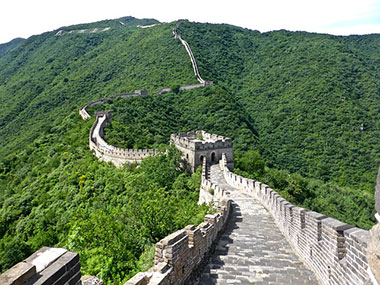 Great Wall of China
Photo by Siggy Nowak
 Tibet woman in traditional dress
Photo by Jacquemay Dominique
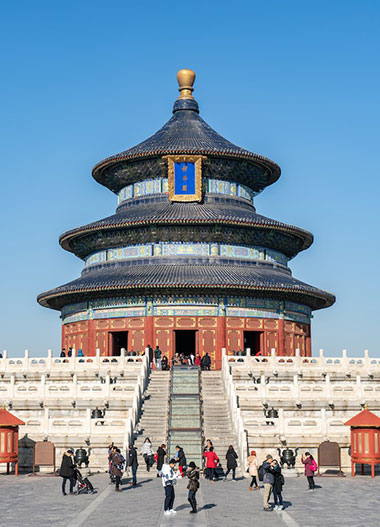 Temple of Heaven
Photo by Artem Yellow
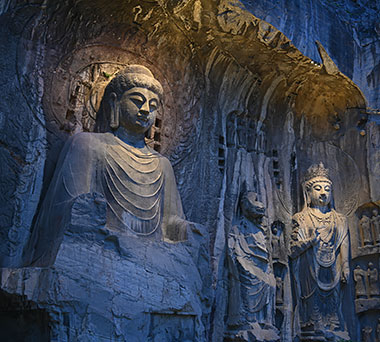 Longmen Grottoes, Luoyang, Henan Province
Photo by Chao Xu
|
 Great Wall of China
Great Wall of China Tibet woman in traditional dress
Tibet woman in traditional dress Temple of Heaven
Temple of Heaven Longmen Grottoes, Luoyang, Henan Province
Longmen Grottoes, Luoyang, Henan Province